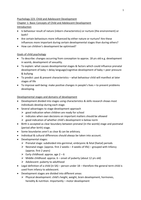Summary
Summary Psychology 223 Notes
- Course
- Institution
A comprehensive summary of all work covered in Psychology 223, looking at child and adolescent development. The summary analyses, through lecture and personal notes, 1) basic concepts of child and adolescent development, 2) prenatal and development and the birth process, 3) the neonatal phase and i...
[Show more]



